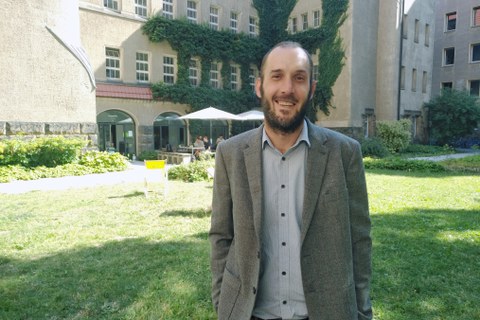Jul 29, 2019
„Dresden Fellow 2019“ Dr. Johan van Tol from South Africa: Meeting the water shortage
Systemic modelling approach for optimising soil and water management in southern Africa
Together with his wife and his three children Dr. Johan van Tol, Associate Professor at the South African University of the Free State in Bloemfontein, has returned home with new contacts and ideas for cooperation on the subjects of soil and water. Van Tol, part of the "Dresden Fellow 2019" program, was a guest at the Institute of Soil Science and Site Ecology at the TU Dresden for one month in July. His goal was, finding scientific partners, who could transfer existing data into computer-aided models and simulations, the base to map the interactions between soil and water in various scenarios. So Dr. Stefan Julich at the institute appeared to be a suitable partner. Among other aspects, the models play an important role for the sustainable development of the South African agricultural sector, which van Tol has always wanted to shape: "If you know, how to manage soils, you know how to do sustainable agriculture." In particular, the coordinated optimisation of soil and water management with regard to the effects of climate change are of importance.
In his field of research, the hydropedology, Dr. van Tol focus on the interactions between soil and water - especially the transport of water and sediment along slopes - from a holistic systemic perspective. Soil studies show him, how the water flow behaves in the soil and how long the water remains there. "What you see in the soil, tells you a story. Every soil has a story," van Tol illustrates his passion for his research topic. His holistic approach can be used to describe changes in the system atmosphere-vegetation-soil as a result of human intervention, for example in agriculture or mining. Among others, that distributes basic information for water management in agriculture. In his research activities van Tol pays attention to the effects of climate change on the Cape Town region. "It´s the reality of climate change. Capetown will be one of the first cities in the world without water", van Tol underlines the urgency of optimising the use of existing water resources in his home country. In contrast to the advancing population growth and thus an increasing demand for food and water in agriculture, the decline in annual precipitation can be observed. In contrast, more frequent extreme events lead to flooding and increased soil erosion.
In possible model scenarios, effects such as deforestation on slopes, intensified agricultural tillage or mining activities on nearby waters and the organisms living in them can be estimated. At the same time, land use can be adapted in such a way that as little consequential damage to the environment as possible occurs.
Prof. Dr. Karl-Heinz Feger, Director of the Institute of Soil Science and Land Evaluation, and Dr. van Tol met at a German-South African BMBF workshop on adaptation to climate change in December 2018. Together with 12 other partners, including medium-sized companies, they submitted a joint research proposal to the BMBF on this cutting-edge forward-looking topic in May of this year.

